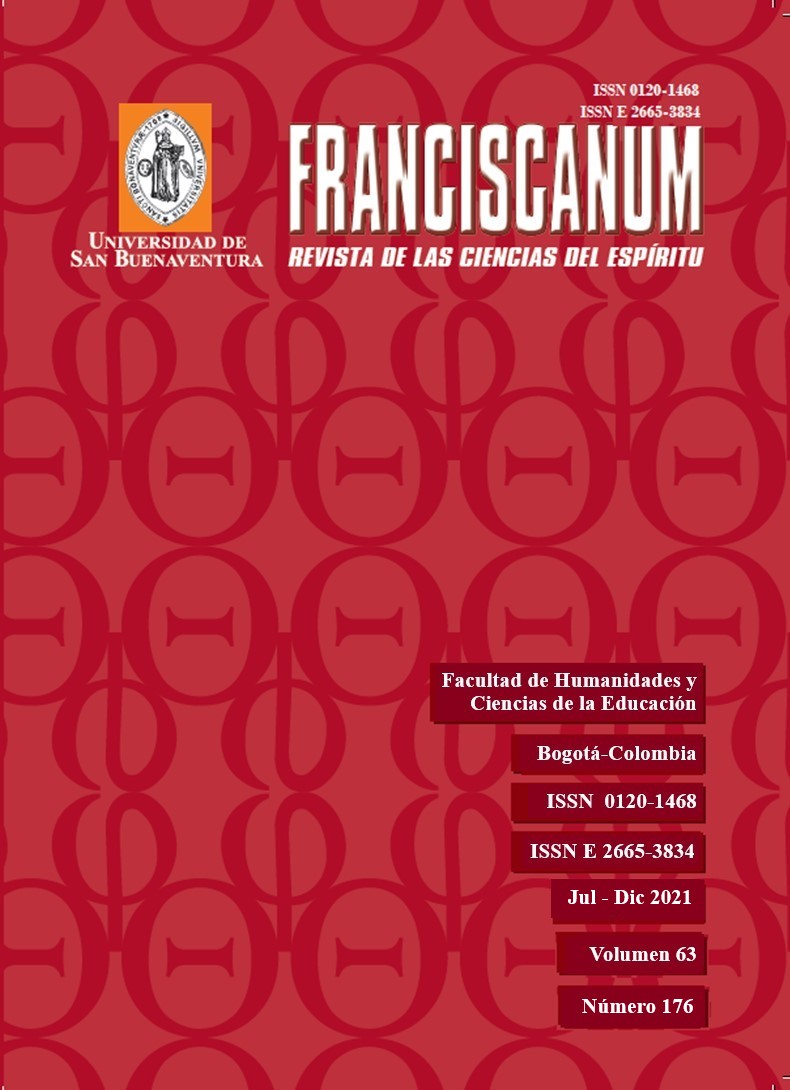This journal provides immediate open access to its content, based on the principle that giving the public free access to research helps a greater global exchange of knowledge.
Therefore, the Creative Commons 4.0 Attribution Attribution - Equal Share (by-sa) License is accepted: The commercial use of the work and the possible derived works is permitted, the distribution of which must be done with a license equal to that regulates the original work.
http://creativecommons.org/licenses/by-sa/4.0/
Along these same lines and in line with the Open Access policy, it is clarified that the authors maintain their rights to articles, without restrictions and, in the same way, they maintain their publication rights, without restrictions. They are only asked to reference the number of the Franciscanum magazine where the article initially appeared.
Abstract
The following paper offers an analysis of the idea of wit according to Juan Huarte in order to construct a philosophic criterion that guides the individual to choose the science that best corresponds to them. This criterion is based on the determination of the different types of wit for the sciences and, according to Huarte, it is not guide by likes or wishes of the individual, but by the natural propensities objectified by the exercised capacities. In contrast to a psychologic perspective, Huarte’s criterion represents an approach based on philosophic ideas, which are deemed within a system of thought that coordinates the intellectual faculties in relation to the sciences, arts and techniques corresponding to the different types of wits.
References
Álvarez, Manuel. Orientación profesional. Barcelona: Cedecs, 1995.
Álvarez-Rojo, Víctor. Orientación educativa y acción orientadora: Relaciones entre la teoría y la práctica. Madrid: EOS, 1994.
Aristóteles. Ética a Nicómaco. Traducido por J. Pallí Bonet. Madrid: Gredos, 1985.
Aristóteles. Moral a Nicómaco. Traducido por Patricio de Azcárate. Madrid: Espasa-Calpe, 1983.
Aristotle. Nicomachean Ethics. Traducido por H. Rackham. Cambridge: Harvard University Press, 1934.
Busot, Jesús. Elección y Desarrollo Vocacional. Caracas: Ediluz, 1995.
Caspi, Avshalom y Silva, Phil. «Temperamental Qualities at Age Three Predict Personality Traits in Young Adulthood: Longitudinal Evidence from a Birth Cohort», Child Development 2, Vol. 66 (1995): 486-498.
Covarrubias, Sebastián de. Tesoro de la lengua castellana o española. Parte segunda. Madrid: Mercader de Libros, 1673.
Fodor, Jerry. La modularidad de la mente. Traducido por J. M. Igoa. Madrid: Ediciones Morata, 1986.
García, Emilio. «Huarte de San Juan. Un adelantado a la teoría modular de la mente». Revista de historia de la Psicología 1, Vol. 24 (2003): 9-25.
Gondra, José María. «Juan Huarte de San Juan y las diferencias de inteligencia». Anuario de Psicología, Vol. 69 (1994): 13-34.
Gracián, Baltasar. El Héroe, El Político, El Discreto, Oráculo Manual y Arte de Prudencia. Barcelona: Plaza y Janés, 1986.
Huarte, Juan. Examen de ingenios. Edición de Guillermo Serés. Madrid: Ediciones Cátedra, 1989.
Ibarz, Josep. «La teoría española del ingenio». Revista de historia de la Psicología 3-4, Vol.12 (1991): 282-286.
Imbernón, Francisco, Coord. Procesos y contextos educativos: Enseñar en las instituciones de educación secundaria. Barcelona: Graó, 2010.
Iriarte, Mauricio. El Doctor Huarte de San Juan y su «Examen de ingenios»: contribución a la historia de la psicología diferencial. Madrid: Consejo Superior de Investigaciones Científicas, 1948.
Ley Orgánica 8/2013, de 9 de diciembre, para la mejora de la calidad educativa. Boletín Oficial del Estado, núm. 295, de 10 de diciembre de 2013, 97858 a 97921. Consultada en julio 9, 2020. https://www.boe.es/buscar/pdf/2013/BOE-A-2013-12886-consolidado.pdf.
Martín, Carlos; Aguilar, José Manuel; Navarro, José Ignacio; Sánchez, Yolanda. «Psicología para el profesorado de Educación Secundaria y Bachillerato». En Desarrollo del pensamiento en la adolescencia, coord. Carlos Martín y José Manuel Navarro, 61-87. Madrid: Ediciones Pirámide, 2011.
Mehler, Jacques y Dupoux, Emmanuel. Nacer sabiendo. Introducción al desarrollo cognitivo del hombre. Traducido por Nuria Sebastián. Madrid: Alianza, 1992.
Murillo, Tomás. Aprobación de ingenios y curación de hipocondricos, con observaciones y remedios muy particulares. Con licencia en Zaragoza por Diego de Ormer, 1672.
Negro, Andrés. La orientación en los centros educativos: Organización y funcionamiento desde la práctica. Barcelona: Graó, 2006.
Noreña, Carlos. Studies in Spanish Renaissance Thought. The Hague: Martinus Nijhoff, 1975.
Orella, Jose Luis. «El pensamiento filosófico y médico de Juan Huarte». Sancho el sabio: Revista de cultura e investigación vasca Vol. 6 (1996): 49-68.
Ormaza-Mejía, Pablo. «Orientación vocacional y profesional». Revista Ciencia UNEMI 30, Vol. 12 (2019): 87-102.
Orobitg, Christine. «Del Examen de ingenios de Huarte a la ficción cervantina, o cómo se forja una revolución literaria». Criticón 120-121 (2014): 23-29.
Ortega y Gasset, José. «Sobre el estudiar y el estudiante». En Obras Completas, IV, Madrid: Revista de Occidente, 1966.
Parras, A., Madrigal, A. M., Redondo, S., Vale, P. & Navarro. E. Orientación educativa: fundamentos teóricos, modelos institucionales y nuevas perspectivas. Ministerio de Educación: CIDE, 2009.
Pérez, Alfredo y Blasco, Pilar. Orientación e inserción profesional: Fundamentos y tendencias. Valencia: Nau Llibres, 2003.
Peset, José Luis. Genio y desorden. Valladolid: Cuatro ediciones, 1999.
Platón. Diálogos, Vol. 1. Traducido por C. García Gual y F. J. Olivieri y E, Lledó. Madrid: Gredos, 2011.
Rodríguez, Ignacio. Discernimiento filosófico de ingenios para artes y ciencias. Madrid: en la oficina de Don Benito Cano, 1795.
Rodríguez, María L. La orientación profesional. Barcelona: Ariel, 1998.
Salillas, Rafael. Un gran inspirador de Cervantes, el Dr. Juan Huarte y su examen de ingenios. Pamplona: Analecta, 2003.
Septuaginta. Editada por Alfred Rahlfs. Stuttgart: Deutsche Bibelgesellschaft, 1979.
Sternberg, Robert. Beyond IQ: A Triarchic Theory of Intelligence. Cambridge: Cambridge University Press, 1985.
Super, D. E. «Dimensions and measurements of vocational maturity». Teachers college records 3, Vol. 57 (1955): 151-163.
Thorndike, Edward. The Measurement of Intelligence. New York: Teachers College, Columbia University, 1927.
Valdés, Juan de. Diálogo de la Lengua. Madrid: Imprenta de Martin Alegría, 1869.
Veláz de Medrano, Consuelo. Orientación e intervención psicopedagógica: Concepto, modelos, programas y evaluación. Archidona: Aljibep, 1998.
Vives, Juan Luis. El alma y la vida. Biblioteca valenciana digital. Consultada en julio 9, 2020. https://bv2.gva.es/corpus/unidad.do?idCorpus=1&idUnidad=9986&posicion=1.
Vives, Juan Luis. Opera Omnia. III. Biblioteca Valenciana Digital. Consultada en julio 9, 2020. https://bv2.gva.es/catalogo_imagenes/grupo.do?ocultarCabecera=S&presentacion=pagina&path=1000004&posicion=302.

 Perfil Google Scholar
Perfil Google Scholar


















